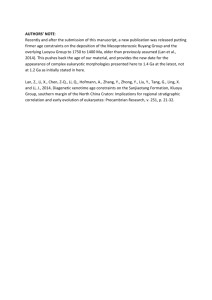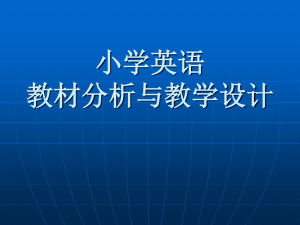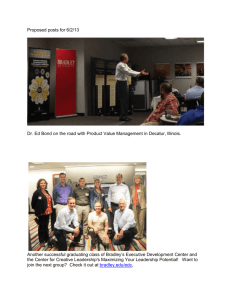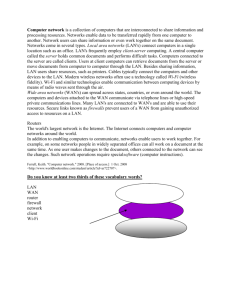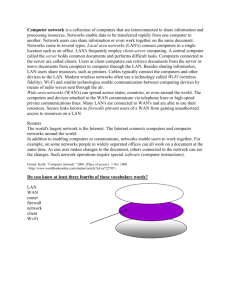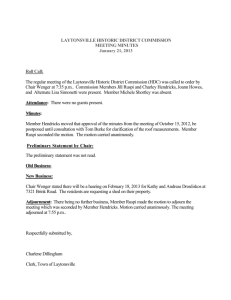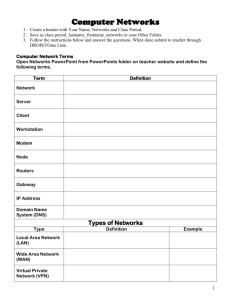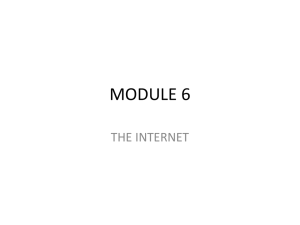Refereed Publications
advertisement
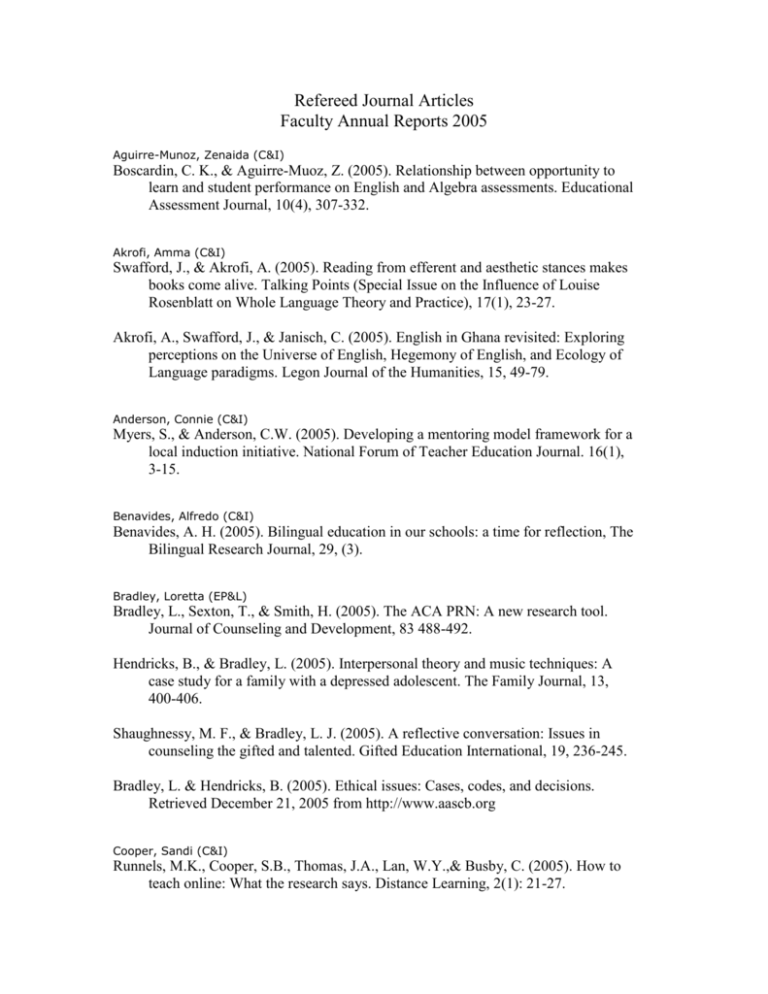
Refereed Journal Articles Faculty Annual Reports 2005 Aguirre-Munoz, Zenaida (C&I) Boscardin, C. K., & Aguirre-Muoz, Z. (2005). Relationship between opportunity to learn and student performance on English and Algebra assessments. Educational Assessment Journal, 10(4), 307-332. Akrofi, Amma (C&I) Swafford, J., & Akrofi, A. (2005). Reading from efferent and aesthetic stances makes books come alive. Talking Points (Special Issue on the Influence of Louise Rosenblatt on Whole Language Theory and Practice), 17(1), 23-27. Akrofi, A., Swafford, J., & Janisch, C. (2005). English in Ghana revisited: Exploring perceptions on the Universe of English, Hegemony of English, and Ecology of Language paradigms. Legon Journal of the Humanities, 15, 49-79. Anderson, Connie (C&I) Myers, S., & Anderson, C.W. (2005). Developing a mentoring model framework for a local induction initiative. National Forum of Teacher Education Journal. 16(1), 3-15. Benavides, Alfredo (C&I) Benavides, A. H. (2005). Bilingual education in our schools: a time for reflection, The Bilingual Research Journal, 29, (3). Bradley, Loretta (EP&L) Bradley, L., Sexton, T., & Smith, H. (2005). The ACA PRN: A new research tool. Journal of Counseling and Development, 83 488-492. Hendricks, B., & Bradley, L. (2005). Interpersonal theory and music techniques: A case study for a family with a depressed adolescent. The Family Journal, 13, 400-406. Shaughnessy, M. F., & Bradley, L. J. (2005). A reflective conversation: Issues in counseling the gifted and talented. Gifted Education International, 19, 236-245. Bradley, L. & Hendricks, B. (2005). Ethical issues: Cases, codes, and decisions. Retrieved December 21, 2005 from http://www.aascb.org Cooper, Sandi (C&I) Runnels, M.K., Cooper, S.B., Thomas, J.A., Lan, W.Y.,& Busby, C. (2005). How to teach online: What the research says. Distance Learning, 2(1): 21-27. Tallent-Runnels, M. K., Lan, W. Y., Fryer, W., Thomas, J. A., Cooper, S., & Wang, K. (2005) The relationship between problems with technology and student evaluations of online teaching, Submitted to The Internet and Higher Education, (8) 167-174. Crooks, Steve (EP&L) Crooks, S. M., Verdi, M. P., & White, D. R. (2005) Effects of contiguity and feature animation in computer-based geography instruction. Journal of Educational Technology Systems, 33(3), 261-183. Baron, J., & Crooks, S. M. (2005). Academic integrity in web-based distance education. TechTrends, 49(2), 40-45 . Srinivasan, S., & Crooks, S. M. (2005). Multimedia in a science learning environment. Journal of Educational Multimedia and Hypermedia 14(2), 151-167. Davidson, Roseanna (EP&L) Laman, E., Davidson, R. C., & Shaughnessy, M. F. (2005). Psychological evaluation of children who are deafblind. New Mexico Review, 13(3),6-11. Duemer, Lee (EP&L) Banks, P.; Cochran, A.; McCrary, J.; Duemer, L. and Salazar, D. 2005. The Story Behind The Catalyst: Channing Club vs. The Board of Regents of TTU. College Student Journal, Vol. 39, 3, 455-460. Gong, Richard () q2a1 Griffin-Shirley, Nora (EP&L) Griffin-Shirley, N. & Nes, S. L. (2005). Self-esteem and empathy in sighted and visually impaired adolescents. Journal of Visual Impairments and Blindness, (99) 5, 276-285. Halsey, Pam (C&I) Halsey, P. (2005). Parent involvement in junior high schools: A failure to communicate. American Secondary Education, 34, 57-69. Halsey, P. (2005). Assessing mathematics tradebooks: Which ones measure up? Reading Improvement, 42, 158-163. Hamman, Douglas (C&I) Hamman, D. & Hendricks, B. (2005). The role of the generations in identity formation: Erikson speaks to teachers of adolescents. The Clearing House: Educational Research, Controversy and Practice, 79 (2), 72-75. Hartmeister, Fred (EP&L) Hartmeister, F., & Fix-Turkowski, V. (2005). Getting even with schoolyard bullies: Legislative responses to campus provocateurs. Education Law Reporter 195, 134. Hendricks, Bret (EP&L) Bradley, L.J. & Hendricks, C.B. (2005). Ethical situations encountered by counselors: Some solutions. American Association of State Counseling Boards. http://www.aascb.org Hendricks, C.B & Bradley, L.J. (2005) Interpersonal theory and music therapy techniques. Family Journal, 13. 400-405. Peregoy, J.J., Rooney, S.C., Campbell, B.W. & Hendricks, C.B. (2005) Society, Identity and Meaning: Alcohol and Other Drug Preventions for mental health professionals working with gay, lesbian and bisexual clients. American Counseling Association Vista, Fall 2005, 68-74. Hamman, D. & Hendricks, B. (2005). The role of the generations in identity formation: Erikson speaks to teachers of adolescents. The Clearing House, no. 79:72-76 Janisch, Carole (C&I) Akrofi, A. K., Swafford, J. , and Janisch, C. (2005). English in Ghana revisited: Exploring perceptions on the universe of English, hegemony of English, and ecology of language paradigms." Legon Journal of the Humanities, XV, 49-79. Klinker, JoAnn (EP&L) Mendez-Morse, S., & Klinker, J. F. (2005). Case study of above average elementary school. UCEA Journal of Cases in Educational Leadership 8, 49-57. Online at http://jel.sagepub.com/cgi/reprint/8/3/49. Lan, William (EP&L) Lan, W., & Williams, A. (2005). Demandingness and responsiveness of advisors as determinants of doctoral students' experience. National Academic Advising Association Journal, 25(1), 31-41. Lan, W. (2005). Self-monitoring and its relationship with educational level and task importance. Educational Psychology 25(1), 109-127. Tallent-Runnels, M. K., Cooper, S., Lan, W. Y., Thomas, J., Busby, C. (2005). How to teach online: What the research says. Distance Education, 2(1), 21-27. Tallent-Runnels, M. K., Lan, W., Fryer, W., Thomas, J. A., Cooper, S., & Wang, K. (2005). The relationship between problems with technology and graduate students' evaluations of online teaching. The Internet and Higher Education, 8(2), 167-174. Lesley, Mellinee (C&I) Lesley, M. (December 2004/January 2005). Looking for critical literacy with content area literacy students. Journal of Adolescent and Adult Literacy, 48(4), 320-334. Lock, Robin (EP&L) Lock, R.H. (2005). Introduction to the twenty ways special issue. Intervention in School and Clinic, Vol. 41(1), pp. 3-4. Lock, R. H.(2005). The twenty ways issue. (Editor). Vol. 41(1), pp. 1-64. Marbley, Aretha (EP&L) Marbley, A. F., & Ferguson, R. (2005). Responding to prisoners reentry, recidivism, and incarceration of inmates of color: A call to the communities. Journal of Black Studies, 35, 633-649. Evans, K., Kincade, E., Marbley, A. F., & Seems, S. (2005) Feminism and feminist therapy: Lessons from the past and hopes for the future. Journal of Counseling and Development: Special Issue: Women and Gender Issues, 83, 269-277. Kees, N. L., Carlson, L., Parmley, R., Dahlen, P., Evans, K., Marbley, A. F., Rozdzial, M., & Seems, S., Snyder, B. (2005) Women and Counseling: A Vision for the Future. Journal of Counseling and Development: Special Issue: Women and Gender Issues, 83, 381-383 . Maushak, Nancy (EP&L) JEMH: Veronikas, S. & Maushak, N. M. (2004) Effectiveness of Audio on Screen Captures in Software Application Instruction, Mendez-Morse, Sylvia (EP&L) Méndez-Morse, S. & Klinker, J. (2005) ?Case Study of Above Average Elementary School. Journal of Cases in Educational Leadership, 89(3), 49-57. Munoz, Juan (C&I) Munoz, J. (2005). The social construction of alternative education: re-examining the margins of public education for at-risk chicano/a student. The High School Journal,88 (2):3-22. Murray, John (EP&L) Murray, J. P. (2005) Why faculty development?: Enhancing faculty knowledge in the community college. http://www.texascollaborative.org/cpmodules.htm. (Invited) Murray, J. P. (2005). Meeting the needs of new faculty at rural community colleges. Community College Journal of Research and Practice, 29(3), 215-232. Myers, Susan (C&I) Myers, S. & Anderson, C. (2005). Developing a mentoring model framework for a local induction initiative.National forum of education research,16(2). Olivarez Jr., Arturo (EP&L) Stevens, T., & Olivárez, Jr., A. (2005) Development of the Mathematics Interest Inventory. Measurement & Evaluation in Counseling & Development, 38, 141152. Stevens, T., & Olivárez, Jr., A. (2005). Statistical significance and evidenced-based policies: A realistic view. Essays in Education. Price, Robert (EP&L) Price, Robert V. A Model for Designing Web Based Units of Instruction, Distance Learning, Jan-Feb, 2005 Rodriguez, Roy (EP&L) Rodriguez,R., et.al. Latino success in math developmental programs in six New Mexico community colleges, Journal of Hispanic Higher Education, vol. 6, #4, 2005. Dent, N., Rodriguez, R. Women,philanthopy and higher education. Journal of Philanthopy, vol. XXVI, #2, 2005. Simpson, Douglas (C&I) Dottin, E., Jones, A., Simpson, D., and Watras, J. (2005). Representing the Social Foundations of Education in NCATE: A Chronicle of Twenty-Five Years of Effort. Educational Studies. 38, 3, 241-254. Siwatu, Kamau (EP&L) n/a Stevens, Tara (EP&L) Stevens, T., & Olivárez, Jr., A. (2005) Development of the Mathematics Interest Inventory. Measurement & Evaluation in Counseling & Development, 38, 141152. Stevens, T., & Olivárez, Jr., A. (2005). Statistical significance and evidenced-based policies: A realistic view. Essays in Education. Tallent-Runnels, Mary (EP&L) Tallent-Runnels, M. K., Lan, W. Y., Fryer, W., Thomas, J. A., Cooper, S., & Wang, K. (2005). The relationship between problems with technology and graduate students' evaluations of online teaching. The Internet and Higher Education, 8, 167-174. Tirri, K., Tallent-Runnels, M. K., & Nokelainen, P. (2005). A cross-cultural study of preadolescents' moral, spiritual, and religious questions. British Journal of Religious Education, 27, 207-214. Tallent-Runnels, M. K., Cooper, S., Lan, W. Y., Thomas, J., & Busby, C. (2005). How to teach online: What the research says. Distance Education, 2(1), 21-27. Thomas, Julie (C&I) Tallent-Runnels, M. K., Lan, W. Y., Fryer, W., Thomas, J. A., Cooper, S., & Wang, K. (2005) The relationship between problems with technology and student evaluations of online teaching, Submitted to The Internet and Higher Education, (8) 167-174. Ahern, T., Thomas, J. A., Tallent-Runnels, M.. K., Lan, W. Y., Cooper, S., Cyrus, J., & Lu, X. (In press). The effect of social grounding on collaboration in a computer-mediated small group discussion. The Internet and Higher Education. Tallent-Runnels, M. K., Cooper, S., Lan, W. Y., Thomas, J., Busby, C. (2005). How to teach online: What the research says. Distance Education, 2(1), 21-27. Todd, Reese (C&I) Todd, R. (2005). Seeking a truce in the social studies wars. [Review of book Social studies wars: What should we teach the children. Evans, R.W. 2004]. Education Review. http://edrev.asu.edu/reviews/rev445.htm. Todd, R. (2005, Fall/Winter). Wonders beyond the classroom walls. The Texan (21)2:p 53 Wagoner, Richard (EP&L) Wagoner, R. L., Metcalfe, A., & Olaore, I. (2005). Fiscal reality and academic quality: Part-time faculty and the challenge to organizational culture at community colleges. Community College Journal of Research and Practice, 29, 25-44. White, David (EP&L) Crooks, S. M., Verdi, M. P., & White, D. R. (2005) Effects of contiguity and feature animation in computer-based geography instruction. Journal of Educational Technology Systems, 33(3), 259-281. Wilhelm, Jennifer (C&I) Wilhelm, J. and Confrey, J. (2005). Designing project-enhanced environments: Students investigate waves and sound. The Science Teacher, 72(9): 42-45. Castro-Filho, J., Wilhelm, J., and Confrey, J. (May, 2005). Understanding rate of change using motion detectors: One teacher's voice, perspective, and growth. International Journal for Mathematics Teaching and Learning. http://www.cimt.plymouth.ac.uk/journal/default.htm Williams, Amanda (EP&L) Lan, W., & Williams, A. S. (2005). Doctoral students' perceptions of advising style and development and the relationship between them. National Academic Advising Association Journal. Zhang, Ke (EP&L) Zhang, K., & Hung, J. (2006). E-learning in Taiwan: Policies, practices, and problems. International Journal of Information and Communication Technology Education, 2(1), 37-52. Zhang, K., & Hung, J. (2005). Taiwan Gao Deng Jiao Yu e-learning de Xian Zhuang Yu Si Kao (in English: Status of and critical reflections upon e-learning in Taiwan's higher education). New Waves: Educational Research & Development, 10(3), 24-30.
